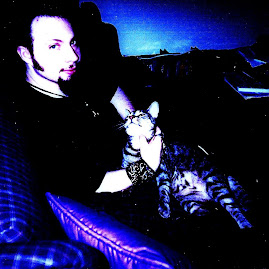About
a month ago, my blood brother Scott Mosely aka Vesbius Flestrin,
invited me over for a swinging Saturday filled with some drinking and
great conversation, not to mention a few listens to everything from Eric
Dolphy to Loudness on Spotify. But the centerpiece of the day was no
doubt the viewing of a trifecta of Japanese films, though they were all
completely different.
We
launched this wildly disparate trio of flicks with Masaki Kobayashi's
immortal classic Harakiri (aka Seppuku). We were entranced by the film's
stunning widescreen black and white photography, and its slow burn until
the action erupts in the final reel. This film definitely has a message,
and challenges Japan's long prevailing samurai code. In its rigorous
defiance of this code, Harakiri is different than the majority of
chambara (samurai films), and is among the most subversive films of that
era of Japanese cinema.
The
brilliant actor Tatsuya Nakadai (The Face of Another, Ran, The Sword of
Doom) carries the picture with grim
determination and raw conviction. As Tsugumo, a ronin petitioning to commit harakiri, he spends most of the film reciting tales, shown in flashback, about the circumstances that led to him coming before a samurai council. Tsugumo - displaced, disgraced, and distraught - peels back layers of the past to share his story with the heedless
samurai council. After this lengthy but compelling litany of his
family's sorrows, the ronin falls victim to the council's arrogant politics. The conclusion of the picture, which the film has been
suspensefully building towards through its entirety, does not
disappoint. It drives Kobayashi's point home in a stunning action
setpiece as Tsugumo is set upon by his once fellow samurai.
Scott
and I were equally impressed, though I'd seen Harakiri a few times prior
to this, and it was Scott's first time. Next up was Latitude Zero, and our positions were reversed. Unlike Scott, this was my first viewing. The film
was directed by Godzilla vet Ishiro Honda, and was great fun from start
to finish. Latitude Zero is an adaptation of a 1940s radio serial heavily inspired
by Jules Verne's classic character Captain Nemo. The main character of
the radio show, and of the film was Captain Craig McKenzie (played with
aplomb by Joseph Cotten), who helms a nuclear submarine called the Alpha
(it was the Omega in the radio show) clearly patterned on Nemo's
Nautilus. One angle that makes McKenzie more intriguing in the movie, as
well as in its source material, is McKenzie's immortality, an attribute
shared by his arch-nemesis and former colleague played by Cesar Romero.
They make several teasing comments about their age (they are at least
180 or so years old), and how they know each other, but the answers are
not to be found, nor were they in the radio version of Latitude Zero.
The
action is plentiful, and the low rent sci-fi imagery, especially aboard
the Alpha, is quite impressive, though it would be derided today for
not using CGI for enhancement. But Honda was always good at making
the most of his limited resources, and this film is no exception.
For Verne fans, pulp fans, and afficionados of slightly cheesy but fun flicks, you could do worse than Latitude Zero. However, it is out of
print on DVD currently and commanding large sums of cash. Scott, you're a
lucky man to have nabbed this one when you could.
Our
final selection for the evening ran kind of late, and I wasn't able to
view it all before taking off. Luckily, I'd seen this one once before,
though I didn't recall much of it. Hayao Miyazaki's Howl's Moving
Castle was our final choice for the evening's fare - an acclaimed, yet
idiosyncratic anime put out under the Studio Ghibli imprint (now owned
by Disney - as with almost all things of late...). In this film, Howl is
a sorcerer with a "moving castle", an ambulatory, steampunk-influenced
juggernaut. A girl named Sophie has been cursed by the Witch of the
Wastes to become an old hag. After a Faustian bargain with the demon
Calcifer, Sophie is saved by Howl, who now loves her, and she is
returned to her usual 18 year old self. Skimming the
plot does not do justice to the imagination and charm of this complexly
rendered anime. Like all the Ghibli product I've seen (which,
admittedly, is not nearly enough), its appeal bridges nations and age groups. I look forward to finally viewing this one, start to finish, and retaining it.
So ends another Covert-Flestrin filmfest, and so ends the '2013' segment of my blog. If there's interest, I'll continue blogging on film from time to time. If anyone wishes to leave me a comment, please do so below or on my Facebook page linking to this. Special thanks to my dear friends Sean Levin and Bill White for their support.

















.jpg)


.PNG)









No comments:
Post a Comment